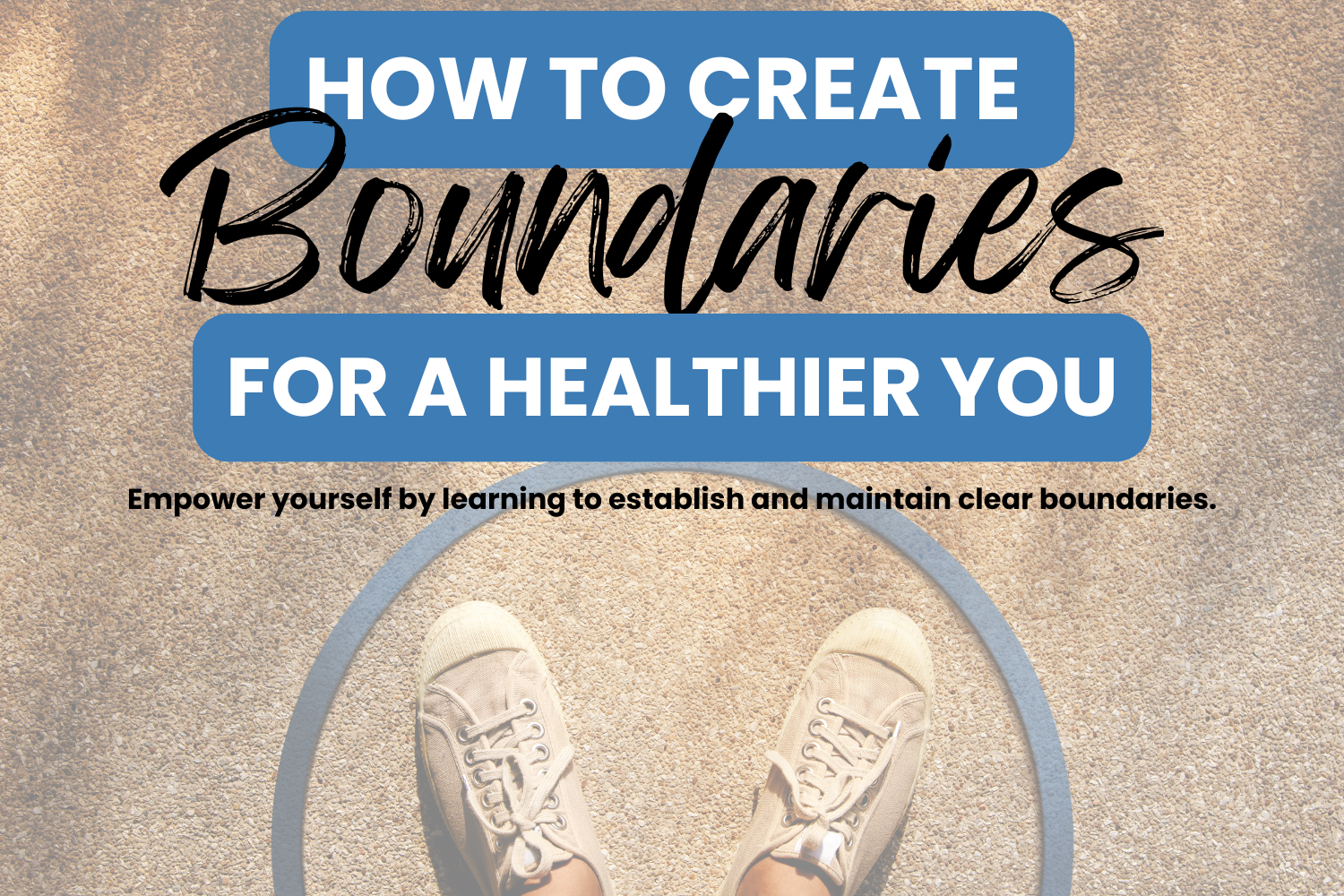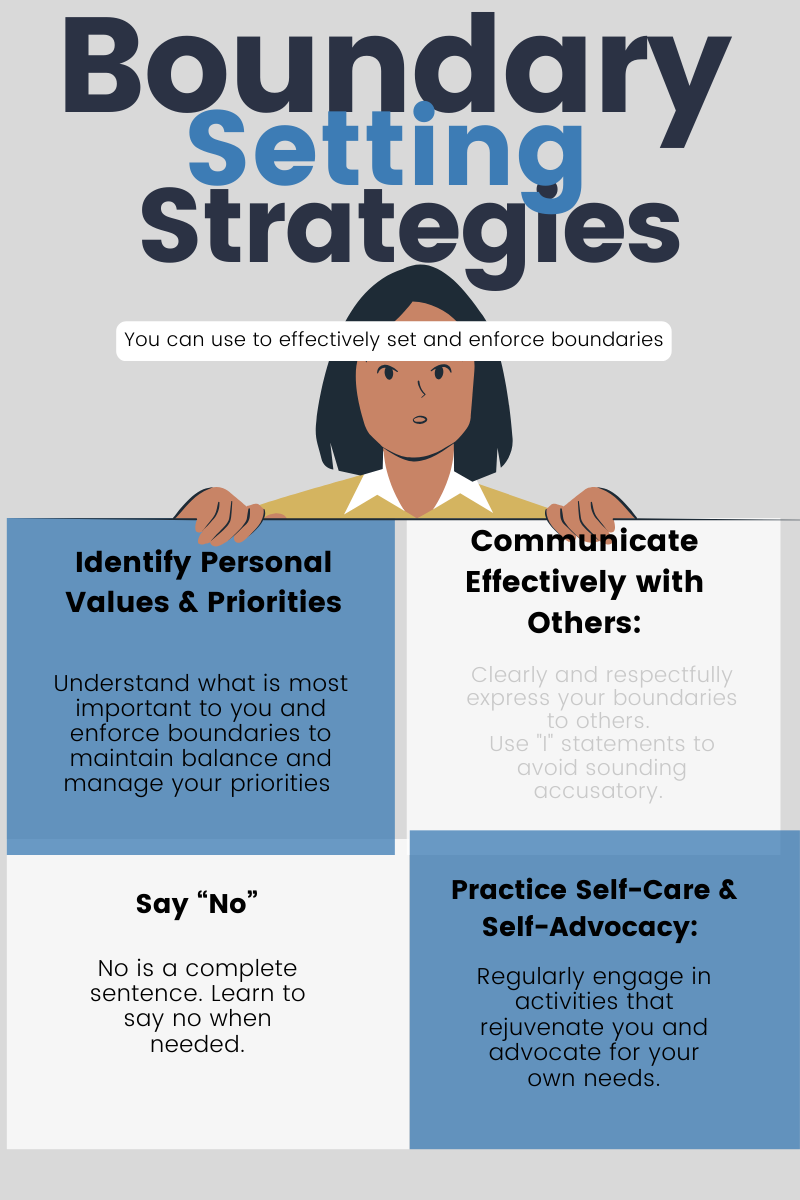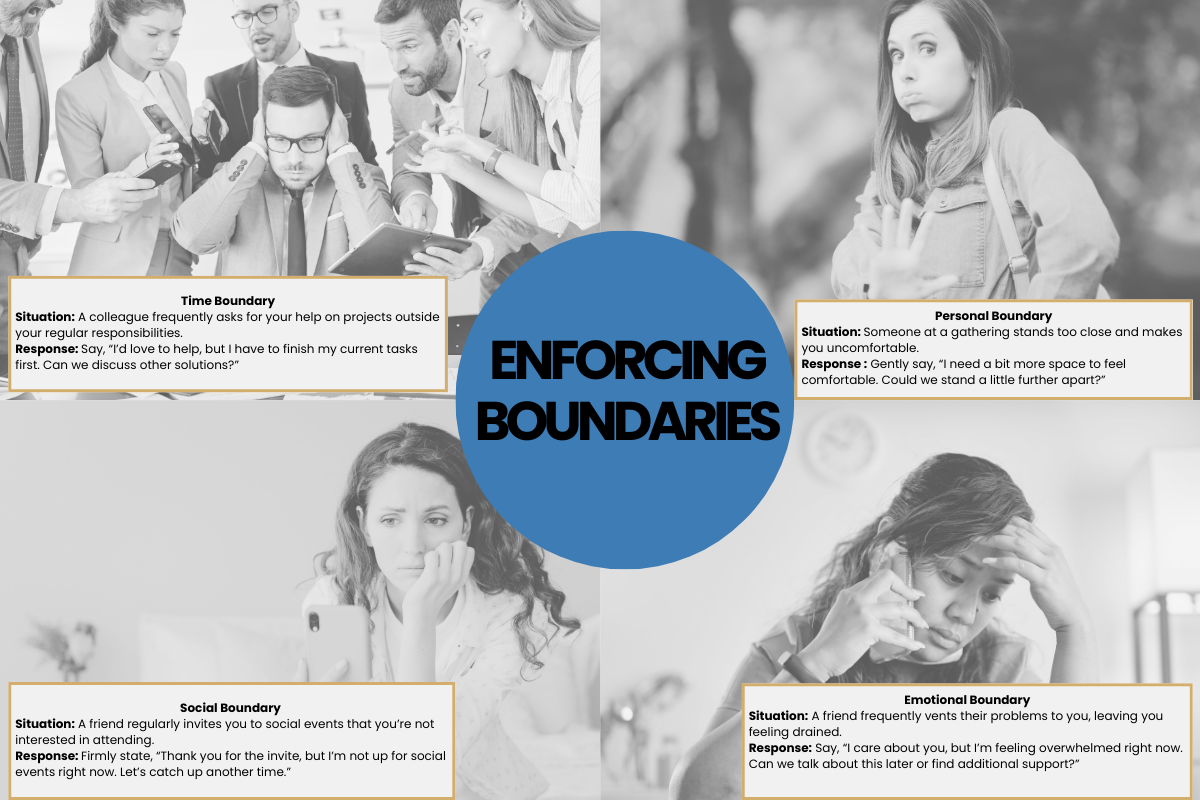Creating Boundaries for a Healthier You
Setting Boundaries for a Healthier Life
Frequently unspoken or unnoticed, yet unmistakably felt when crossed—boundaries.
What are boundaries and what are the tell-tale signs that they have been crossed?
How do you know when you should enforce a boundary?
How often are you checking in with yourself to determine what areas in your life that may benefit from having healthy and consistent boundaries?
Many have or will experience a moment when a boundary is crossed, leading to a range of feelings and emotions that prompt us to make decisions. Should you confront the person or entity that crossed the boundary? How can you prevent it from happening again?
Regardless of the approach you choose, it’s easy to neglect or avoid boundaries if you’re not self-aware and cautious, often to avoid conflict, discipline, or change. This is especially challenging when the boundary involves a loved one or close friend and requires significant change or discipline. The closeness of the relationship or habit may influence your willingness or resistance to establish and enforce the boundary.
This challenge is heightened for individuals who are people-pleasers or prone to codependency. Boundaries require us to evaluate our lives and make adjustments that positively impact our mental, physical, and emotional health.
What is a boundary exactly?
According to Merriam-Webster’s dictionary, the definition of boundary is something that points out or shows a limit or end.
Boundaries are the limits we set for ourselves in relationships, work, and personal time to protect our well-being. They define what is acceptable and unacceptable behavior from ourselves, others and help maintain our mental health by ensuring that we have the space to care for ourselves. Without clear boundaries, we can become overwhelmed, stressed, and resentful.
Therefore boundaries are imperative in order to achieve a healthy and balanced life and are used to enforce limits for both yourself and others.
Boundaries are a fundamental and intimate act of self-love and self-care. In today’s culture, self-love and care are widely promoted by experts, social media influencers, and health professionals. Boundaries are crucial for success in both practices. Setting appropriate boundaries not only reduces unnecessary stress and anxiety but also reinforces your self-worth to yourself and others, ultimately demonstrating and exemplifying both self-love and self-care.
Boundaries are dynamic and come in various forms. Boundaries are more than just physical and come in various forms. In addition to physical boundaries, they can include emotional, relational, time, and financial boundaries, among others. During COVID, many of us became hyper-aware and/or hyper-vigilant about physical boundaries, leading us to be more intentional, vocal, and strict about enforcing limits. This heightened awareness also extended to other types of boundaries, as we navigated changes in our personal and professional lives.
Boundaries come in many forms. It is important to understand how and when boundaries should be enforced.
Physical Boundaries: These refer to personal space and physical touch, involving respect for personal space and individual comfort levels. With the onset of COVID, many people became hyper-aware and vigilant about enforcing and protecting these boundaries to preserve their health. Examples of physical boundaries include declining hugs from strangers or informing someone that their touch is unwelcome or inappropriate.
Emotional Boundaries: These protect our feelings and emotions by separating them from those of others, preventing emotional manipulation, and not taking responsibility for others' feelings. This boundary safeguards your peace and sanity while honoring the limits you set. Emotional boundaries might include avoiding relationships or situations that trigger negative emotions. For example, if a specific place consistently triggers an emotional reaction, it’s important to set a boundary and inform others that you’re uncomfortable going there. If you don’t enjoy bars or clubs and your friends keep inviting you, you can simply state that you won’t attend. Similarly, if casual dating affects your mental health, it’s important to set a personal boundary to avoid dating those who prefer casual relationships.
Relational Boundaries: These define the rules and expectations within our relationships, maintaining mutual respect and ensuring that both parties' needs and values are honored. This boundary protects your peace and sanity while respecting the relationship's limits. Setting boundaries with family, partners, or close friends can be challenging due to the desire to honor their positions, especially with parents, siblings, or other relatives. To avoid conflict, you might be tempted to have loose boundaries, particularly if enforcing them could cause hurt or confusion. However, it’s important to remember that while forgiveness is vital, it does not mean you must have unrestricted boundaries. If someone continues to disregard your boundaries, it’s okay to take the necessary steps to enforce them and preserve your peace.
Consequences of Boundary Violations: Stress, Resentment, and Burnout
Stress
When boundaries are not respected nor enforced, the results can be detrimental. Stress levels can increase, leading to mental and physical health issues. According to the American Psychological Association (APA), chronic stress is linked to health conditions such as heart disease, hypertension, diabetes, depression, anxiety, and other illnesses .
For more detailed information, you can refer to the APA’s Stress Effects on the Body.
Resentment
Another consequence of a boundary violation is resentment. Resentment is a feeling of anger or displeasure that can build up over time if underlying issues are not addressed. As resentment grows, it can deteriorate your relationships with others and yourself, potentially causing significant damage.
Burnout
A lack of appropriate boundaries can lead to overcommitting, difficulty saying “no,” neglect of self-care, and emotional exhaustion. Over time, this can result in burnout, characterized by overwhelming exhaustion and a sense of helplessness. Burnout can severely impact your physical health, mental well-being, and relationships, potentially causing chronic fatigue, cardiovascular issues, depression, anxiety, cognitive impairments, and emotional depletion.
For more detailed information on the consequences of burnout , see the following article
Signs That Boundaries May Be Needed in Various Areas of Life
Identifying the need for boundaries is crucial.
Here are a few Signs That Boundaries May Be Needed in Various Areas of life. Take a moment to reflect on the following phrases. If you identify with a majority of them, it may be beneficial to create boundaries.
I feel overwhelmed or drained by interactions with certain people.
I experience resentment towards demands placed on my time or energy.
I have a constant need to please others at the expense of my own well-being.
I find it difficult to say no or feel guilty when I do.
If you need additional help with setting boundaries, click here to schedule a session.
Setting boundaries can be challenging, particularly if you tend to be a people pleaser or avoid conflict. However, establishing clear boundaries is essential for maintaining your well-being.
Here are a few strategies you can use to effectively set and enforce boundaries:
Identify Personal Values and Priorities: Understand what is most important to you. This clarity will help you determine where to set your boundaries. Spend time journaling or brainstorming to identify your personal values and priorities. Ask yourself questions like, “In what situations do I feel most comfortable and respected, and what boundaries contribute to this feeling?” or “When someone crosses a boundary, what personal values or principles feel violated, and how do I respond?”
Communicate Effectively with Others: Clearly and respectfully express your boundaries to others. Use "I" statements to avoid sounding accusatory. Here are a few examples that you can use.
1. “I feel [emotion] when [specific situation] because [reason].”
Example: “I feel frustrated when meetings run late because it cuts into my personal time.”
2. “I need [specific need] because [reason].”
Example: “I need some quiet time in the evenings because it helps me unwind and recharge.”
3. “I would appreciate it if [specific request] because [reason].”
Example: “I would appreciate it if you could give me a heads-up before dropping by because it helps me manage my schedule better.”
4. “I find it difficult to [specific challenge] when [specific situation], and I would like [specific solution].”
Example: “I find it difficult to concentrate when there’s a lot of noise, and I would like to use noise-canceling headphones during work hours.”
5. “I feel [emotion] about [specific issue], and I think we could resolve it by [specific solution].”
Example: “I feel overwhelmed about the number of tasks on my plate, and I think we could resolve it by delegating some of them.”
Using “I” statements helps to express personal feelings and needs without blaming or criticizing others, which can lead to more productive and respectful communication.
Say “No” Assertively and Without Guilt:
No is a complete sentence. Learn to say no when needed. Saying no is a radical act of self-love and care.
Assertiveness involves communicating your needs and feelings clearly and honestly, while respecting the rights and perspectives of others. It means expressing yourself directly without being passive, aggressive, or manipulative. Assertive communication allows you to advocate for yourself and set boundaries while maintaining a calm and respectful demeanor. It helps you stand up for your own needs and preferences without disregarding others' feelings or rights. Practicing assertiveness can lead to healthier relationships, increased self-confidence, and more effective conflict resolution.
Practice Self-Care and Self-Advocacy:
Regularly engage in activities that rejuvenate you and advocate for your own needs. Setting boundaries in your schedule for healthy meals, hydration, exercise, or rest benefits your relationship with your body, self, and others. Self-care goes beyond spa treatments and massages; it includes any activity that restores you mentally, physically, emotionally, and spiritually. By advocating for yourself, you uphold the boundaries necessary for effective self-care, reinforcing the principle of healthy boundaries.
Boundary-Setting Challenges and How to Overcome Them
It is inevitable that you will run into challenges with setting, implementing, and enforcing boundaries. Setting boundaries can be challenging due to fear of conflict, guilt, or not wanting to disappoint others. This can be extremely intimidating in situations when the boundary challenges a family , relationship , or a personal belief system or dynamic. In situations where there is high conflict or tension, it may be necessary to engage a mediator or therapist. It is important to remember your why behind the boundary and practice self love.
Here are concepts and strategies to keep in mind when facing pushback or challenges in setting boundaries:
Understand that boundaries are essential for healthy relationships and self-care: Recognizing that boundaries protect your well-being and ensure mutual respect can help you prioritize them in your interactions.
Practice boundary-setting in small, manageable steps: Start by establishing simple boundaries in low-stakes situations to build confidence and gradually tackle more complex scenarios.
Practice assertiveness: Communicate your needs and limits clearly and respectfully, ensuring that you are heard without infringing on others’ rights.
Practice setting boundaries by using role-play with a trusted friend, family member, or mental health professional: Role-playing scenarios can help you rehearse and refine your boundary-setting skills in a supportive environment.
Seek support from friends, family, or a therapist: Having a support system can provide guidance, encouragement, and feedback as you work on setting and maintaining your boundaries.
Setting boundaries is an act of self-respect and empowerment. It helps protect your mental health, nurture your relationships, and live a more balanced life. By setting and maintaining boundaries, you create a space where your needs are met, leading to a healthier and more fulfilling life. If you need help creating, implementing, enforcing boundaries, or navigating difficult boundaries within a relationship, feel free to book a session. We look forward to assisting you in any way we can.







